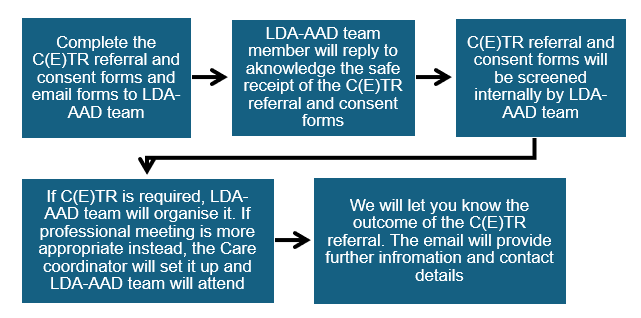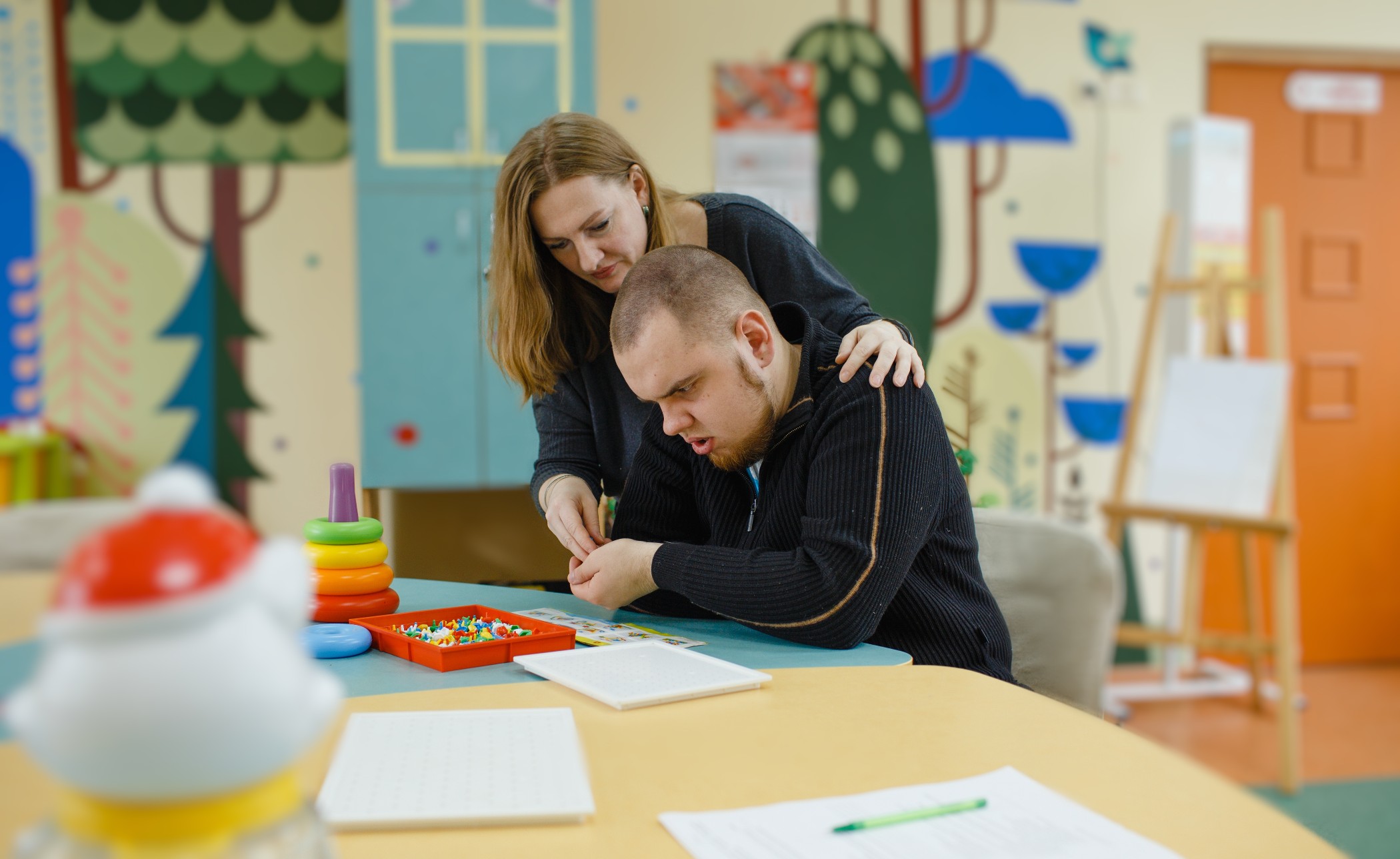C(E)TR is a person-centred review of care, (education) and treatment plans to ensure that the person’s and their family needs are met and to challenge and overcome any barriers for progress and/or discharge.
It's worth noting that the C(E)TR does not decide whether a person should be admitted to or discharged from hospital. This remains the responsibility of clinicians (or the courts/Ministry of Justice (MoJ) under Part 3 of the Mental Health Act 1983).
Everyone has the rights to request the Care, (Education) and Treatment review. It is not a mandatory requirement for someone to be on the Dynamic Support Pathway to be able to have a C(E)TR. However, it may take longer to process C(E)TR referrals for anyone not known to the Dynamic Support Pathway.
The LDA-AAD team will work with partners from Health, Education and Care systems to address the concerns that led to the C(E)TR request in order to reduce the risks of admission to specialist locked Mental Health hospital. Being on the Dynamic Support Pathway also means that LDA-AAD team oversees the challenges, bringing our Health, (Education) and Social Care systems together to make sure the person has the right support when they need it.
Flowchart for Care (Education) and Treatment Review process.

What to expect if C(E)TR meeting is organised for you
In the sections below there is some useful information about what to expect if you or someone you know has had a C(E)TR meeting organised
- Professional working with you should complete and submit the Care, (Education) and Treatment Review referral form to hwicb.lda-aad@nhs.net.
- You need to sign the C(E)TR referral form. If you are under 16 years old, anyone with parental responsibilities for you should sign the C(E)TR consent on your behalf.
- LDA-AAD team member will set up the meeting and share the meeting invite with professionals working with you and any family members or support people that you named in the C(E)TR consent form.
- The C(E)TR panel members will come to talk to you on the day of the C(E)TR meeting. You will get 30-60 minutes to talk to the panel members and raise any questions in relation to your current care, education (if applicable) and treatment. You can reject to meet with the panel members if that is your choice.
- At the end of the C(E)TR meeting you, family and friends (if you provided consent) or anyone with parental responsibilities for you can attend the Feedback session where panel members will share their findings and set actions to be completed by professionals working with you.
- A copy of the C(E)TR Action Plan will be shared with everyone involved in the C(E)TR meeting.
- You will be able to meet with the chair of the C(E)TR meeting to discuss any actions or queries you might have.
- You have 48 hours after the C(E)TR meeting to provide any feedback or raise concerns about the meeting.
- If you are in the secure Mental Health hospital, you will have C(E)TR meeting at least annually. The meeting will be organised by our regional colleagues who commission a hospital bed for you.
- If you are in locked rehabilitation Mental Health hospital, you will have the C(E)TR meeting at least every 6 months. The meeting will be organised by LDA-AAD colleagues as LDA-AAD team commissions a hospital bed for you.
- If you are young person under 18 years old, you will have C(E)TR meeting at least every 3 months. The meeting will be organised by our regional colleagues who commission a hospital bed for you.
- You need to sign the C(E)TR referral form. If you are under 16 years old, anyone with parental responsibilities for you should sign the C(E)TR consent on your behalf. Signed C(E)TR consent form must be forwarded to hw.complexneedsteam@nhs.net.
- If the meeting is organised by LDA-AAD team, LDA-AAD team member will set up the meeting and share the meeting invite with professionals working with you and any family members or support people that you named in the C(E)TR consent form.
- The C(E)TR panel members will come to talk to you on the day of the C(E)TR meeting. You will get 30-60 minutes to talk to the panel members and raise any questions in relation to your current care, education (if applicable) and treatment. You can reject to meet with the panel members if that is your choice.
- At the end of the C(E)TR meeting you, family and friends (if you provided consent) or anyone with parental responsibilities for you can attend the Feedback session where panel members will share their findings and set actions to be completed by professionals working with you.
- A copy of the C(E)TR Action Plan will be shared with everyone involved in the C(E)TR meeting.
- You will be able to meet with the chair of the C(E)TR meeting to discuss any actions or queries you might have.
- You have 48 hours after the C(E)TR meeting to provide any feedback or raise concerns about the meeting.
- When you will be discharged from specialist Mental Health hospital, you are entitled to have a post discharge Care, (Education) and Treatment Review (C(E)TR) meeting within 6 weeks of your discharge.
- You need to sign the C(E)TR referral form. If you are under 16 years old, anyone with parental responsibilities for you should sign the C(E)TR consent on your behalf. Signed C(E)TR consent form must be forwarded to hwicb.lda-aad@nhs.net.
- LDA-AAD team member will set up the meeting and share the meeting invite with professionals working with you and any family members or support people that you named in the C(E)TR consent form.
- The C(E)TR panel members will come to talk to you on the day of the C(E)TR meeting. You will get 30-60 minutes to talk to the panel members and raise any questions in relation to your current care, education (if applicable) and treatment. You can reject to meet with the panel members if that is your choice.
- At the end of the C(E)TR meeting you, family and friends (if you provided consent) or anyone with parental responsibilities for you can attend the Feedback session where panel members will share their findings and set actions to be completed by professionals working with you.
- A copy of the C(E)TR Action Plan will be shared with everyone involved in the C(E)TR meeting.
- You will be able to meet with the chair of the C(E)TR meeting to discuss any actions or queries you might have.
- You have 48 hours after the C(E)TR meeting to provide any feedback or raise concerns about the meeting.
- Depends on the circumstances, the post discharge C(E)TR meeting might be replaced with the post discharge Multi Disciplinary Team (MDT) meeting. Actions from this meeting will be shared with everyone involved in the MDT meeting.
If you would like to request the C(E)TR, please complete C(E)TR referral form and enclose signed consent form by the person for whom the C(E)TR has been requested. If person lacks capacity, then Mental Capacity Assessment and Best Interest decision to be completed and forwarded to LDA-AAD team alongside the completed C(E)TR referral form.
If the C(E)TR request is for a child or Young Person under 16 years old, then the parent or someone who has parental responsibility should sign the C(E)TR consent form.
All forms are attatched below and should be returned to LDA-AAD team (hwicb.lda-aad@nhs.net).



